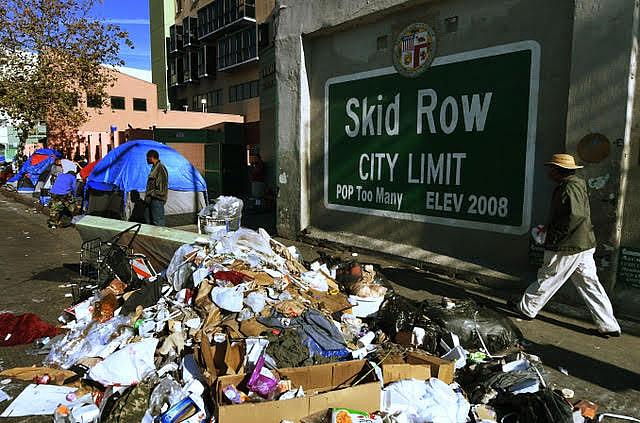How the Medicaid expansion has helped the homeless

Homelessness has become a national crisis, particularly in Los Angeles County where an estimated 58,000 men, women and children are living in shelters and on the streets. These appallingly high numbers of homeless people have prompted both city and county leaders and advocates to seek new solutions to address the problem.
Last year, voters passed Proposition H, which creates housing options within the city of Los Angeles for the growing homeless population. The county’s recently enacted Proposition HHH supplements housing with nearly $1 billion in for support services including case management, outreach, and treatment for mental health and substance use. Both acute and chronic health problems are disproportionately high among homeless people including chronic mental illness, diabetes and circulatory problems, substance abuse disorders, HIV/AIDS, tuberculosis and other infectious diseases and oral health disease.
That’s why Medicaid, known as Medi-Cal in California, is key to the county’s effort to permanently house homeless people. Prior to the Affordable Care Act’s expansion of Medicaid, health providers faced many obstacles in helping their homeless patients enroll in Medicaid. Even though their poverty and susceptibility to health problems made them obvious candidates, the process typically required extensive documentation of ongoing health or mental health problems, followed by an approval process that could easily stretch to over a year.
Those barriers were a big reason why fewer than 20 percent of homeless people in California were enrolled in Medi-Cal, California’s Medicaid program, before the ACA. This made it exceptionally difficult for physicians to connect their homeless patients to ongoing care. Homeless patients with complex medical needs often required a specialist for a consultation or a life-saving procedure. Others needed a mental health specialist or a drug treatment counselor. Without Medi-Cal, doctors had few options other than sending their homeless patients to hospital emergency departments for care.
The ACA was a game-changer for homeless adults and their doctors. In a recent study, clinics that provide health care for the homeless in Los Angeles now report that 80 percent of their homeless patients are covered by Medi-Cal. Los Angeles County had a head start: It used a federal waiver in 2010 to enroll indigent adults into a county program called Healthy Way LA. Homeless adults throughout the County signed up through community and county clinics, which enabled many to transition into Medi-Cal once the ACA was in place. Once enrolled, many homeless people became part of organized systems of care, with their coverage opening doors to a medical team and a range of services that patients need to stabilize their health and move off the street.
The ACA was a game-changer for homeless adults and their doctors. In a recent study, clinics that provide health care for the homeless in Los Angeles now report that 80 percent of their homeless patients are covered by Medi-Cal.
Enrolling people in Medi-Cal is key to addressing homelessness in Los Angeles. One example is the Los Angeles County Housing for Health program, which uses an interdisciplinary outreach team to identify appropriate housing for chronically homeless individuals while simultaneously connecting them to health providers to address health and mental health problems.
Republicans in Congress have made repeated attempts to repeal the ACA’s Medicaid expansion and convert the program to block grants. Such moves would threaten much of the progress we’ve made on homeless health. Obamacare gave states the option to expand their Medicaid programs to cover single adults and childless couples, with the federal government paying virtually all of the cost in the first few years. The Republican-sponsored plans, including the Senate’s Better Care Reconciliation Act and the House’s American Health Care Act, called for phasing out support for the Medicaid expansion, reducing overall federal support by over $850 billion and shifting the entire system to fixed per-person payments to the states. In turn for getting less money, states would have more flexibility in how they run their Medicaid programs but would have to find their own resources when program costs exceed federal payments.
The homeless had the most to lose from the proposed Medicaid rollback. Medicaid has traditionally covered specific groups such as poor children, pregnant women, the disabled, blind and low-income elderly. It also supports long-term care for many Americans. In states that adopted the expansion, the Affordable Care Act extended coverage to adults with incomes less than 138 percent of the federal poverty level. In California, the majority of the 2.4 million people who enrolled into Medi-Cal, are low income adults previously ineligible for the program. Before the ACA, if states wanted to cover the homeless, they couldn’t depend on federal funds to help pay for their care without obtaining federal waivers. Thus, indigent adults were largely left out of most states’ Medicaid programs. This included California, which covered indigent adults until 1982 when it dropped them from Medi-Cal and gave block grants to the counties to provide for their health care.
More recent proposals would increase the flexibility of states to design their own programs. While such flexibility could help states tailor programs to the needs of their populations, people in some states may find new obstacles to getting needed care. For example, Medicaid work requirements could result in many homeless people losing their Medicaid coverage, worsening their health conditions and hampering efforts to get people off the streets.
Last year’s legislative assault on the Medicaid expansion and the more recent embrace of work requirements in conservative states only undermine efforts to reduce homelessness in this country.
Michael R. Cousineau is a professor at the Keck School of Medicine at USC and a board member of the Northeast Valley Health Corporation. He can be reached at cousinea@usc.edu.
[Photo: Mark Ralston/AFP/Getty Images]

